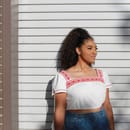Remember the casting call for Straight Outta Compton in which hopefuls for the “hottest of the hottest” parts were told they “should be light-skinned” while the “poor, not in good shape” roles were meant for women with “medium to dark skin tone”? Yeah…that was colorism, the discrimination toward dark-skinned individuals in which lighter-skinned people are seen as more desirable. Due to the history of slavery, it is no surprise that colorism plagues the Black community. With colorism planting self-hatred amongst ourselves, skin color is weaponized to discriminate us against one another. Today, the topic is taboo among African Americans and can often be awkward or intense to discuss. Here are just some elements of these conversations:
Team Light Skin vs. Team Dark Skin
If I had a penny for every time I heard this colorist debate, I’d be a millionaire by now.

Hashtags #teamlightskin and #teamdarkskin have exacerbated the skin rivalry while perpetuating discriminative stereotypes that light-skinned people are stuck up whereas dark-skinned people are jealous of those with lighter skin than them. Many of the arguments from the heated online debate stem from colorist ideologies in which those with lighter and fairer skin tones are perceived as the epitome of beauty, while those with darker skin tones are seen as envious of those that are light-skinned. This debate problematically promotes the false idea that having a darker skin tone is a burden. The debate has gotten so ridiculous that there was even a water gun fight held in Honduras called Team Light Skin’ded vs. Team Dark Skin’ded!
The Case of Zendaya and Megan Thee Stallion
The 5’10” tall, talented women Zendaya and Megan Thee Stallion are making their marks in the acting and rap industry, but it is a lie to say that they are treated equally. For example, Zendaya constantly is showered with compliments on her height and praised for her model-like figure. On the flipside, Megan (a cisgender woman) has thousands of internet memes calling her a man and suspecting she is transgender. These different treatments only emphasize the prejudiced reality, as dark skin women’s femininity is questioned and seen as less feminine unless they attain European features such as a slim nose to “compensate” for their dark appearance.
Dating
Unfortunately, a lot of our Black brothers and sisters chase after light skin partners with the mentality that they wouldn’t date anyone darker than themselves. Self-hate much?

Even the excuse that they don’t want their children to pop out of the womb darker than themselves is absurd. It’s a major blow to our self-esteem when the ordinary thoughts typically go like, “I wonder if he likes dark skin girls.” Oh! And don’t forget the most heinous microaggression of them all — “You’re pretty for a dark skin girl.” This slap to the face translates to, “I don’t usually find darker women attractive, but you’re an exception.” Cue the eye-rolling.
As a brown-skinned woman who falls in the middle of the light skin dark skin spectrum, colorism as a child led me to unconsciously believe that fairer complexions than mine were more beautiful than my hazelnut skin. To this day, I still struggle with my own confidence from the jokes and microaggressions such as, “You’re not that dark.” Although this is the reality, hope still shines through on social media platforms with Black creators calling out colorism. In the end, we must recognize that all skin tones in our African American community are uniquely beautiful and should not be pitted against each other on a silly colorist scale.



